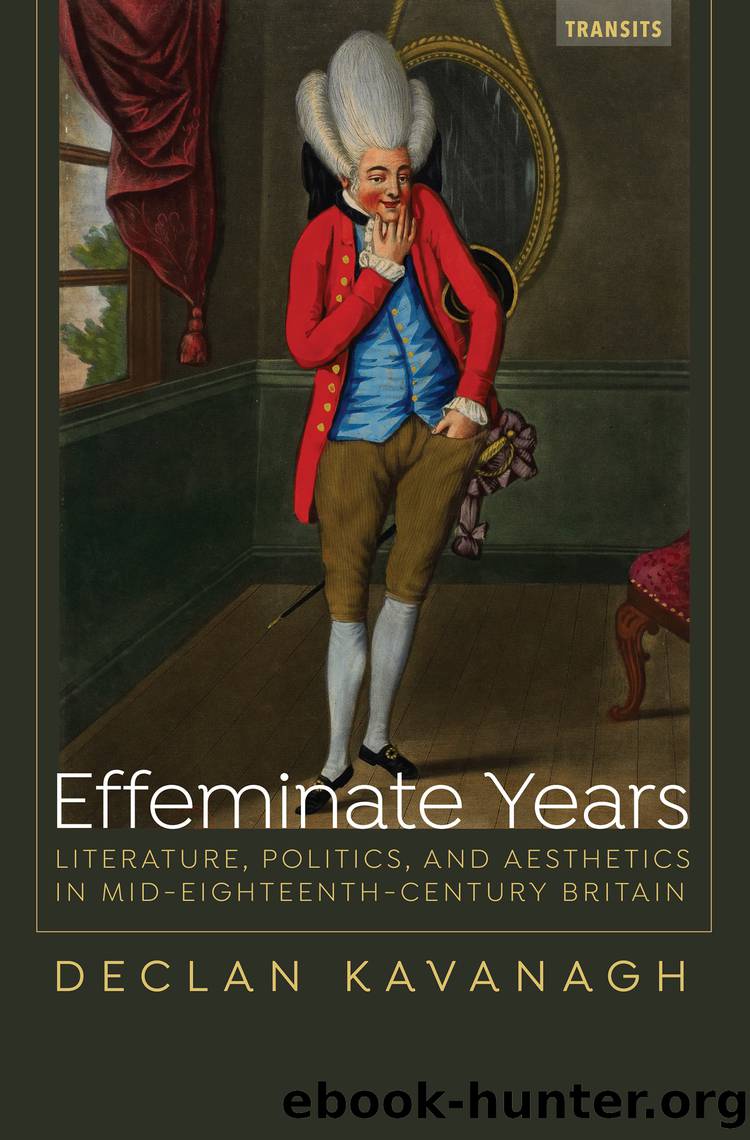Effeminate Years by Kavanagh Declan;

Author:Kavanagh, Declan; [Kavanagh, Declan]
Language: eng
Format: epub
Publisher: Bucknell University Press
Published: 2017-05-19T00:00:00+00:00
4
Bog Men: Celtic Landscapes during the Seven Yearsâ War
I shall not enquire whether you are a North Briton, a South Briton, or an Antient Briton, but I shall venture to pronounce with your antagonist, that you are little better than a Foolish Briton, for having undertaken a task at once so odious and impracticable. Had you stood forth the champion of any particular minister however respectable he might be in point of real character, I should consider you a sort of Don Quixote in humanity, going to encounter the wind-mills of popular clamour and abuse, which it is the passion and privilege of an English mob to raise and discharge at all administrations. But in taking up the cudgels for a minister who happened to be born on the north-side of the Tweed, I know not whether you most excite my pity or indignation. All you can say, Sir, in his justification, may be answered in one word, and that word shall be unanswerable: it shall have more efficacy than the ABRACADABRA, or any talisman that ever necromancy contrived. . . . I will silence you with one word; he is aâScotchman.1
âThe Briton, no. 4, 1762
In the fourth issue of the proministerial essay sheet The Briton (Saturday, June 19, 1762), a fictional contributor relates the impracticality of defending a Scottish minister in the face of Londonâs decidedly anti-Scottish rabble. In the charged, xenophobic climate of the closing months of the Seven Yearsâ War, any âFoolish Britonâ who would labor to defend the âCocoa Tree Cabal,â also known as the âPeace Partyâ of Lord Bute and Henry Fox, must first confront the fact that âScotchmanâ has become âa term which implies everything that is vile and detestable.â2 In this instance, place of birth predetermines a form of political illegitimacy, a lack of agency or authority that cannot be easily gainsaid. Later in the issue, Smollettâs fictional addresser tells an anecdote that aligns the Scot with other delegitimized forms of identity. The anecdote involves a contest between two physicians for a position at an unidentified city hospital. The addresser recounts how an âhonest fish-mongerâ approached one of the candidates to express his approval of his candidacy for the position of doctor, explaining that the doctorâs âopponent was a man of worse character.â3 When prompted to explain his remarks, the fishmonger reportedly assured the candidate that âThe worst they can say of you is, that you are an Atheist and a Sâte [Sodomite], but your competitor is a Scotchman.â4 A denizen of London and a constituent of the sort of Wilkesite rabble that Smollett and Murphy denounce in The Briton and The Auditor, the fishmonger can overlook the doctorâs atheism and sodomitical tendencies, but cannot discount the other candidateâs Scottish birth.
As John Brewer has shown, a pervasive anti-Scottish attitude was particular to the metropolitan social and cultural space of London in 1760s, with the abuse directed at Bute inversely proportionate to the support that Wilkes attracted. Targeting the discursive polarity of
Download
This site does not store any files on its server. We only index and link to content provided by other sites. Please contact the content providers to delete copyright contents if any and email us, we'll remove relevant links or contents immediately.
The Power of Myth by Joseph Campbell & Bill Moyers(681)
Four Shakespearean Period Pieces by Margreta de Grazia(666)
A Social History of the Media by Peter Burke & Peter Burke(640)
Inseparable by Emma Donoghue(610)
The Complete Correspondence 1928-1940 by Theodor W. Adorno & Walter Benjamin(510)
Bodies from the Library 3 by Tony Medawar(487)
The Spike by Mark Humphries;(470)
Culture by Terry Eagleton(465)
A Theory of Narrative Drawing by Simon Grennan(461)
World Philology by(452)
Ideology by Eagleton Terry;(445)
Farnsworth's Classical English Rhetoric by Ward Farnsworth(444)
A Reader’s Companion to J. D. Salinger’s The Catcher in the Rye by Peter Beidler(432)
Adam Smith by Jonathan Conlin(425)
Comic Genius: Portraits of Funny People by(410)
Monkey King by Wu Cheng'en(403)
Game of Thrones and Philosophy by William Irwin(400)
High Albania by M. Edith Durham(399)
Early Departures by Justin A. Reynolds(383)
